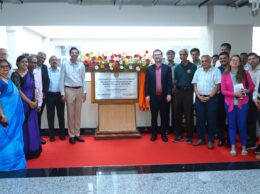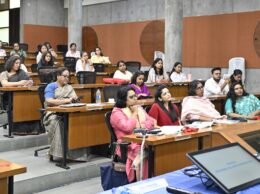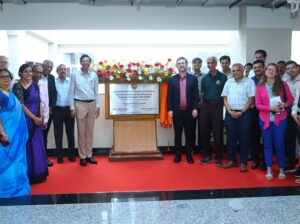The Brij Disa Centre for Data Science and Artificial Intelligence (CDSA) at the Indian Institute of Management Ahmedabad (IIMA), in collaboration with the Wadhwani Foundation, released a report today on the perceived and expected impact of Artificial Intelligence (AI) on Indian white-collar workers. The event was attended by Professor Bharat Bhasker, Director, IIMA; Mr. Prakash Kumar, CEO, Wadhwani Centre for Government Digital Transformation; Professor Sriram Sankaranarayanan, Co-Chairperson (CDSA), IIMA; and authors of the report.
The report, titled “Labour-force Perception about AI – A Study on Indian White-collar Workers”, finds that AI’s impact is not futuristic any longer; it has already begun. Some key findings from the report are:
- 55% of employees surveyed reported that they have used AI tools at their workplaces. Furthermore, 48% of survey participants indicated that their organisations provided them training to use these tools.
- The benefits of AI for efficiency and productivity improvement are also being experienced. 72% of respondents acknowledge that AI boosts their work performance, and 59% believe that AI complements their job functions.
- How much disruption is expected in the job landscape for the white-collar workers? 68% of employees expect AI to partially or fully automate their jobs within the next five years. Further, 40% are concerned that their current skills may become redundant. However, the scenario is not all bleak. 53% of respondents thought AI will create new jobs.
- The perception survey reveals some structural weaknesses which need to be addressed. The current graduation/postgraduate setup is not optimal for the AI era. The awareness and adoption of AI tools and AI training are low among recent graduates and entry-level workers (less than five years of experience). This may indicate a gap in their current education and training, which organisations can address through training and upskilling programmes.
- Further AI adoption and awareness is uneven across industries, at least as far as the survey sample is concerned. Education, IT, manufacturing, and healthcare are actively training and exposing employees to AI. Retail and trade, and infrastructure are laggards in this aspect. Public administration is well-informed and tends to expose its employees to AI. A surprise finding in this study is the finance and insurance industry not featuring among the top industries in training and exposing their employees to AI – but this shortfall in perception may be due to the higher expectations from these industries.
Speaking during the report launch, Professor Bharat Bhasker, Director, IIMA, said, “We must accept the fact that AI, ML, AR-VR, and other cutting-edge technologies have transitioned from being mere elements of science fiction to becoming integral parts of our present reality. The AI age is upon us, and its influence is growing significantly within the workforce and across various industries. Businesses and employees are realising the potential for enhanced efficiency and innovation through AI technologies, while industries are beginning to grasp the transformative impact of AI on everything from customer service to product development. This report is very timely as it provides critical insights into the growing awareness and adoption of AI by employees and businesses for long-term success.”
Sharing more insights about the report, Professor Anindya Chakrabarti, a faculty member in the Economics Area of IIMA and lead Principal Investigator of the study said, “AI is a strategic imperative for India, critical for maintaining and enhancing its economic competitiveness. In face of the global concerns about the negative effects of AI on employment, the Indian corporate sector and policymakers must understand how AI can sustain and complement employment rather than substituting it. With a strong talent pool, a vibrant startup ecosystem, and a data-rich environment, India is well-positioned to capitalize on AI advancements. The study shows the white-collar workforce is embracing AI tools, and that is a good thing. Business leaders and policymakers should recognize the high adoption rate as a pivotal moment in India’s pursuit of AI advancement. The report advocates the need of AI-centric coordination at the national level to build strong collaboration among academia, industry, and government and spearhead diverse efforts to maintain a balanced path between productivity growth and concentration of economic gain.”
This research report represents one of the earliest efforts to understand AI’s impact on India’s white-collar workforce, offering valuable insights for policymakers, business leaders, and the academic community for informed policy-making, strategic planning, and effective workforce development initiatives. The findings are based on detailed interviews with 31 business executives, a field survey of over 550 white-collar employees, and an analysis of over 70,000 job vacancies in India from public data sources.
The report is co-authored by Prof. Anindya Chakrabarti – Economics Area, IIMA; Prof. Ankur Sinha – Operation and Decision Sciences Area and Co-Chairperson (CDSA), IIMA; Prof. Aditya C. Moses – Human Resource Management Area, IIMA; Mr. Deep Narayan Mukherjee – Partner, Boston Consulting Group (BCG); Mr. Debjit Ghatak – former Centre Head, Brij Disa CDSA, IIMA; and Amita Todkar – Research Associate, Brij Disa CDSA, IIMA; along with Wadhwani Foundation as the research partner.









